- Home
- A. S. Byatt
Possession Page 2
Possession Read online
Page 2
That was eleven-fifteen. The clock ticked, motes of dust danced in sunlight, Roland meditated on the tiresome and bewitching endlessness of the quest for knowledge. Here he sat, recuperating a dead man’s reading, timing his exploration by the library clock and the faint constriction of his belly. (Coffee is not to be had in the London Library.) He would have to show all this new treasure-trove to Blackadder, who would be both elated and grumpy, who would anyway be pleased that it was locked away in Safe 5 and not spirited away to Robert Dale Owen University in Harmony City, with so much else. He was reluctant to tell Blackadder. He enjoyed possessing his knowledge on his own. Proserpina was between pages 288 and 289. Under page 300 lay two folded complete sheets of writing paper. Roland opened these delicately. They were both letters in Ash’s flowing hand, both headed with his Great Russell Street address and dated, June 21st. No year. Both began “Dear Madam,” and both were unsigned. One was considerably shorter than the other.
Dear Madam,
Since our extraordinary conversation I have thought of nothing else. It has not often been given to me as a poet, it is perhaps not often given to human beings, to find such ready sympathy, such wit and judgment together. I write with a strong sense of the necessity of continuing our talk, and without premeditation, under the impression that you were indeed as much struck as I was by our quite extraordinary to ask if it would be possible for me to call on you, perhaps one day next week. I feel, I know with a certainty that cannot be the result of folly or misapprehension, that you and I must speak again. I know you go out in company very little, and was the more fortunate that dear Crabb managed to entice you to his breakfast table. To think that amongst the babble of undergraduate humour and through all Crabb’s well-wrought anecdotes, even including the Bust, we were able to say so much, that was significant, simply to each other. I cannot surely be alone in feeling
The second one ran:
Dear Madam,
Since our pleasant and unexpected conversation I have thought of little else. Is there any way in which it can be resumed, more privately and at more leisure? I know you go out in company very little, and was the more fortunate that dear Crabb managed to entice you to his breakfast table. How much I owe to his continuing good health, that he should feel able and eager, at eighty-two years of age, to entertain poets and undergraduates and mathematical professors and political thinkers so early in the day, and to tell the anecdote of the Bust with his habitual fervour without too much delaying the advent of buttered toast.
Did you not find it as strange as I did, that we should so immediately understand each other so well? For we did understand each other uncommonly well, did we not? Or is this perhaps a product of the over-excited brain of a middle-aged and somewhat disparaged poet, when he finds that his ignored, his arcane, his deviously perspicuous meanings, which he thought not meanings, since no one appeared able to understand them, had after all one clear-eyed and amused reader and judge? What you said of Alexander Selkirk’s monologue, the good sense you made of the ramblings of my John Bunyan, your understanding of the passion of Iñez de Castro … gruesomely resurrecta … but that is enough of my egoistical mutter, and of those of my personae, who are not, as you so rightly remarked, my masks. I would not have you think that I do not recognise the superiority of your own fine ear and finer taste. I am convinced that you must undertake that grand Fairy Topic—you will make something highly strange and original of it. In connection with that, I wonder if you have thought of Vico’s history of the primitive races—of his idea that the ancient gods and later heroes are personifications of the fates and aspirations of the people rising in figures from the common mind? Something here might be made of your Fairy’s legendary rootedness in veritable castles and genuine agricultural reform—one of the queerest aspects of her story, to a modern mind. But I run on again; assuredly you have determined on your own best ways of presenting the topic, you who are so wise and learned in your retirement.
I cannot but feel, though it may be an illusion induced by the delectable drug of understanding, that you must in some way share my eagerness that further conversation could be mutually profitable that we must meet. I cannot do not think I amcan be mistaken in my belief that our meeting was also important interesting to you, and that however much you may value your seclusion
I know that you came only to honour dear Crabb, at a small informal party, because he had been of assistance to your illustrious Father, and valued his work at a time when it meant a great deal to him. But you did come out, so I may hope that you can be induced to vary your quiet days with
I am sure you understand
Roland was first profoundly shocked by these writings, and then, in his scholarly capacity, thrilled. His mind busied itself automatically with dating and placing this unachieved dialogue with an unidentified woman. There was no year on the letters, but they must necessarily come after the publication of Ash’s dramatic poems, Gods, Men and Heroes, which had appeared in 1856 and had not, contrary to Ash’s hopes and perhaps expectations, found favour with the reviewers, who had declared his verses obscure, his tastes perverse and his people extravagant and improbable. “The Solitary Thoughts of Alexander Selkirk” was one of those poems, the musings of the castaway sailor on his island. So was “The Tinker’s Grace,” purporting to be Bunyan’s prison musings on Divine Grace, and so was Pedro of Portugal’s rapt and bizarre declaration of love, in 1356, for the embalmed corpse of his murdered wife, Iñez de Castro, who swayed beside him on his travels, leather-brown and skeletal, crowned with lace and gold circlet, hung about with chains of diamonds and pearls, her bone-fingers fantastically ringed. Ash liked his characters at or over the edge of madness, constructing systems of belief and survival from the fragments of experience available to them. It would be possible, Roland thought, to identify the breakfast party, which must have been one of Crabb Robinson’s later efforts to provide stimulating conversation for the students of the new London University.
Crabb Robinson’s papers were kept in Dr Williams’s Library in Gordon Square, originally designed as University Hall, supported by Robinson as a place in which lay students could experience collegiate university life. It would, it must, be easy to check in Robinson’s diary an occasion on which Ash had breakfasted at 30 Russell Square with a professor of mathematics, a political thinker (Bagehot?) and a reclusive lady who knew about, who wrote, or proposed to write, poetry.
He had no idea who she might be. Christina Rossetti? He thought not. He was not sure that Miss Rossetti would have approved of Ash’s theology, or of his sexual psychology. He could not identify the Fairy Topic, either, and this gave him a not uncommon sensation of his own huge ignorance, a grey mist, in which floated or could be discerned odd glimpses of solid objects, odd bits of glitter of domes or shadows of roofs in the gloom.
Had the correspondence continued? If it had, where was it, what jewels of information about Ash’s ‘ignored, arcane, deviously perspicuous meanings’ might not be revealed by it? Scholarship might have to reassess all sorts of certainties. On the other hand, had the correspondence ever in fact started? Or had Ash finally floundered in his inability to express his sense of urgency? It was this urgency above all that moved and shocked Roland. He thought he knew Ash fairly well, as well as anyone might know a man whose life seemed to be all in his mind, who lived a quiet and exemplary married life for forty years, whose correspondence was voluminous indeed, but guarded, courteous and not of the most lively. Roland liked that in Randolph Henry Ash. He was excited by the ferocious vitality and darting breadth of reference of the work, and secretly, personally, he was rather pleased that all this had been achieved out of so peaceable, so unruffled a private existence.
He read the letters again. Had a final draft been posted? Or had the impulse died or been rebuffed? Roland was seized by a strange and uncharacteristic impulse of his own. It was suddenly quite impossible to put these living words back into page 300 of Vico and return them to Safe 5. He looked about hi
m: no one was looking: he slipped the letters between the leaves of his own copy of the Oxford Selected Ash, which he was never without. Then he returned to the Vico annotations, transferring the most interesting methodically to his card index, until the clanging bell descended the stairwell, signifying the end of study. He had forgotten about his lunch.
When he left, with his green and tomato boxes heaped on his Selected Ash, they nodded affably from behind the issue desk. They were used to him. There were notices about mutilation of volumes, about theft, with which he quite failed to associate himself. He left the building as usual, his battered and bulging briefcase under his arm. He climbed on a 14 bus in Piccadilly, and went upstairs, clutching his booty. Between Piccadilly and Putney, where he lived in the basement of a decaying Victorian house, he progressed through his usual states of somnolence, sick juddering wakefulness, and increasing worry about Val.
2
A man is the history of his breaths and thoughts, acts, atoms and wounds, love, indifference and dislike; also of his race and nation, the soil that fed him and his forebears, the stones and sands of his familiar places, long-silenced battles and struggles of conscience, of the smiles of girls and the slow utterance of old women, of accidents and the gradual action of inexorable law, of all this and something else too, a single flame which in every way obeys the laws that pertain to Fire itself, and yet is lit and put out from one moment to the next, and can never be relumed in the whole waste of time to come.
So Randolph Henry Ash, ca 1840, when he was writing Ragnarök, a poem in twelve books, which some saw as a Christianising of the Norse myth and some trounced as atheistic and diabolically despairing. It mattered to Randolph Ash what a man was, though he could, without undue disturbance, have written that general pantechnicon of a sentence using other terms, phrases and rhythms and have come in the end to the same satisfactory evasive metaphor. Or so Roland thought, trained in the post-structuralist deconstruction of the subject. If he had been asked what Roland Michell was, he would have had to give a very different answer.
In 1986 he was twenty-nine, a graduate of Prince Albert College, London (1978) and a PhD of the same university (1985). His doctoral dissertation was entitled History, Historians and Poetry? A Study of the Presentation of Historical ‘Evidence’ in the Poems of Randolph Henry Ash. He had written it under the supervision of James Blackadder, which had been a discouraging experience. Blackadder was discouraged and liked to discourage others. (He was also a stringent scholar.) Roland was now employed, parttime, in what was known as Blackadder’s Ash Factory (why not Ashram? Val had said), which operated from the British Museum, to which Ash’s wife, Ellen, had given many of the manuscripts of his poems, when he died. The Ash Factory was funded by a small grant from London University and a much larger one from the Newsome Foundation in Albuquerque, a charitable trust of which Mortimer Cropper was a trustee. This might appear to indicate that Blackadder and Cropper worked harmoniously together on behalf of Ash. This would be a misconception. Blackadder believed Cropper to have designs on those manuscripts lodged with, but not owned by, the British Library, and to be worming his way into the confidence and goodwill of the owners by displays of munificence and helpfulness. Blackadder, a Scot, believed British writings should stay in Britain and be studied by the British. It may seem odd to begin a description of Roland Michell with an excursus into the complicated relations of Blackadder, Cropper and Ash, but it was in these terms that Roland most frequently thought of himself. When he did not think in terms of Val.
He thought of himself as a latecomer. He had arrived too late for things that were still in the air but vanished, the whole ferment and brightness and journeyings and youth of the 1960s, the blissful dawn of what he and his contemporaries saw as a pretty blank day. Through the psychedelic years he was a schoolboy in a depressed Lancashire cotton town, untouched alike by Liverpool noise and London turmoil. His father was a minor official in the County Council. His mother was a disappointed English graduate. He thought of himself as though he were an application form, for a job, a degree, a life, but when he thought of his mother, the adjective would not be expurgated. She was disappointed. In herself, in his father, in him. The wrath of her disappointment had been the instrument of his education, which had taken place in a perpetual rush from site to site of a hastily amalgamated three-school comprehensive, the Aneurin Bevan school, combining Glasdale Old Grammar School, St Thomas à Becket’s C of E Secondary School and the Clothiers’ Guild Technical Modern School. His mother had drunk too much stout, “gone up the school,” and had him transferred from metal work to Latin, from Civic Studies to French; she had paid a maths coach with the earnings of a paper-round she had sent him out on. And so he had acquired an old-fashioned classical education, with gaps where teachers had been made redundant or classroom chaos had reigned. He had done what was hoped of him, always, had four A’s at A Level, a First, a PhD. He was now essentially unemployed, scraping a living on part-time tutoring, dogsbodying for Blackadder and some restaurant dishwashing. In the expansive 1960s he would have advanced rapidly and involuntarily, but now he saw himself as a failure and felt vaguely responsible for this. He was a compact, clearcut man, with precise features, a lot of very soft black hair, and thoughtful dark brown eyes. He had a look of wariness, which could change when he felt relaxed or happy, which was not often in these difficult days, into a smile of amused friendliness and pleasure which aroused feelings of warmth, and something more, in many women. He was generally unaware of these feelings, since he paid little attention to what people thought about him, which was part of his attraction. Val called him Mole, which he disliked. He had never told her so.
He lived with Val, whom he had met at a Freshers’ tea party in the Student Union when he was eighteen. He believed now, though this belief may have been a mythic smoothing of his memory, that Val was the first person his undergraduate self had spoken to, socially that was, not officially. He had liked the look of her, he remembered, a soft, brown uncertain look. She had been standing on her own, holding a teacup in front of her, not looking about her, but rather fixedly out of the window, as though she expected no one to approach and invited no one. She projected a sort of calm, a lack of strife, and so he went over to join her. And since then they had never not been together. They signed up for the same courses and joined the same societies; they sat together in seminars and went together to the National Film Theatre; they had sex together and moved together into a one-roomed flat in their second year. They lived frugally off a diet of porridge and lentils and beans and yogurt; they drank a little beer, making it spin out; they shared book-buying; they were both entirely confined to their grants, which did not go far in London, and could not be supplemented with holiday earnings, for these had vanished with the oil crisis. Val had been, Roland was sure, partly responsible for his First. (Along with his mother and Randolph Henry Ash.) She simply expected it of him, she made him always say what he thought, she argued points, she worried constantly about whether she was, whether they both were, working hard enough. They quarrelled hardly at all and when they did it was almost always because Roland expressed concern about Val’s reserve with the world in general, her refusal to advance opinions in class and, later, even to him. In the early days she had had lots of quiet opinions, he remembered, which she had offered him, shyly slyly, couched as a kind of invitation or bait. There had been poems she had liked. Once she had sat up naked in his dark digs and recited Robert Graves:
She tells her love while half asleep,
In the dark hours,
With half-words whispered low:
As Earth stirs in her winter sleep
And puts out grass and flowers
Despite the snow,
Despite the falling snow.
She had a rough voice gentled, between London and Liverpool, as the group voice was. When Roland began to speak, after this, she put a hand over his mouth, which was as well, for he had nothing to say. Later, Roland noticed, as he himself
had his successes, Val said less and less, and when she argued, offered him increasingly his own ideas, sometimes the reverse side of the knitting, but essentially his. She even wrote her Required Essay on “Male Ventriloquism: The Women of Randolph Henry Ash.” Roland did not want this. When he suggested that she should strike out on her own, make herself noticed, speak up, she accused him of “taunting” her. When he asked, what did she mean, “taunting,” she resorted, as she always did when they argued, to silence. Since silence was also Roland’s only form of aggression, they would continue in this way for days, or, one terrible time when Roland directly criticised “Male Ventriloquism,” for weeks. And then the fraught silence would modulate into conciliatory monosyllable, and back to their peaceful co-existence. When Finals came, Roland did steadily and predictably well. Val’s papers were bland and minimal, in large confident handwriting, well laid out. “Male Ventriloquism” was judged to be good work and discounted by the examiners as probably largely by Roland, which was doubly unjust, since he had refused to look at it, and did not agree with its central proposition, which was that Randolph Henry Ash neither liked nor understood women, that his female speakers were constructs of his own fear and aggression, that even the poem-cycle, Ask to Embla, was the work not of love but of narcissism, the poet addressing his Anima. (No biographical critic had ever satisfactorily identified Embla.) Val did very badly. Roland had supposed she had expected this, but it became dreadfully obvious that she had not. There were tears, night-long, choked, whimpering tears, and the first tantrum.

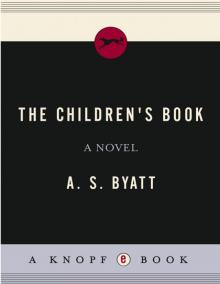 The Children's Book
The Children's Book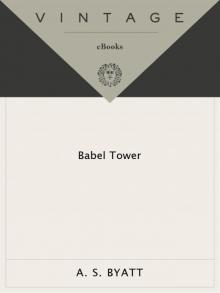 Babel Tower
Babel Tower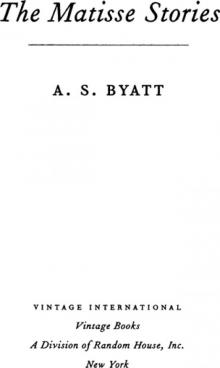 The Matisse Stories
The Matisse Stories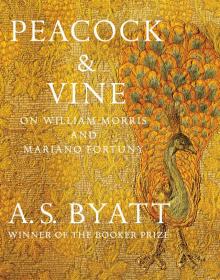 Peacock & Vine: On William Morris and Mariano Fortuny
Peacock & Vine: On William Morris and Mariano Fortuny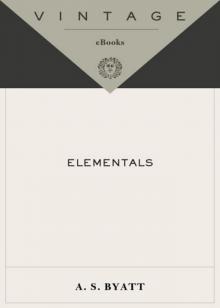 Elementals: Stories of Fire and Ice
Elementals: Stories of Fire and Ice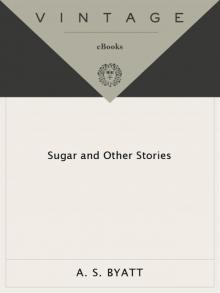 Sugar and Other Stories
Sugar and Other Stories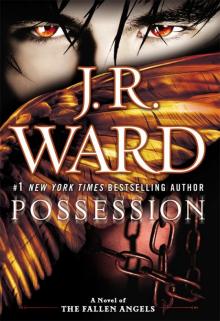 Possession
Possession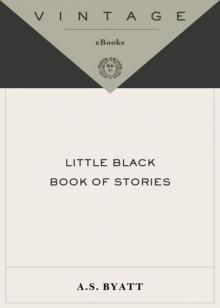 Little Black Book of Stories
Little Black Book of Stories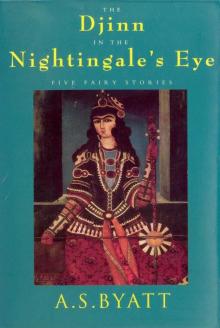 The Djinn in the Nightingale's Eye
The Djinn in the Nightingale's Eye The Virgin in the Garden
The Virgin in the Garden The Game
The Game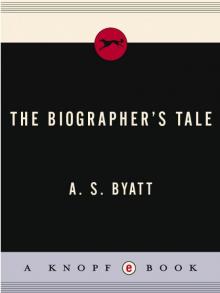 The Biographer's Tale
The Biographer's Tale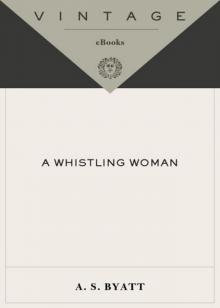 A Whistling Woman
A Whistling Woman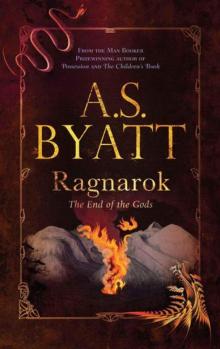 Ragnarok
Ragnarok Angels & Insects: Two Novellas
Angels & Insects: Two Novellas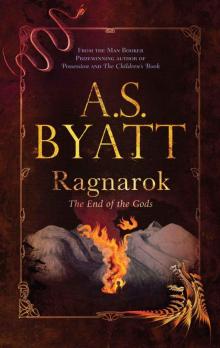 Ragnarok: the End of the Gods (Myths)
Ragnarok: the End of the Gods (Myths)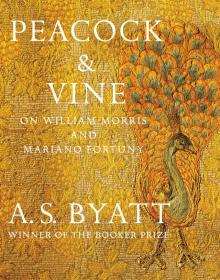 Peacock & Vine
Peacock & Vine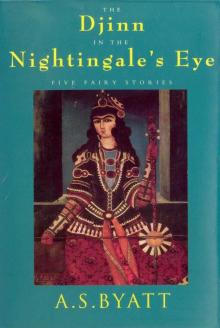 The Djinn in the Nightingale's Eye (Vintage International)
The Djinn in the Nightingale's Eye (Vintage International) Angels and Insects
Angels and Insects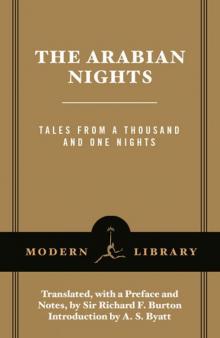 The Arabian Nights: Tales from a Thousand and One Nights (Modern Library Classics)
The Arabian Nights: Tales from a Thousand and One Nights (Modern Library Classics)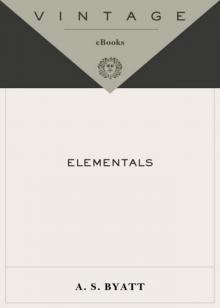 Elementals
Elementals